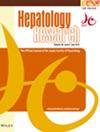Comparable outcomes among etiologies in early-stage hepatocellular carcinoma: Analysis of a nationwide registry in Japan
Abstract
Aim
Tumor stage and liver function determine the prognosis of patients with hepatocellular carcinoma (HCC). However, prognosis may differ depending on etiology. This study aimed to investigate etiological differences in the prognosis of patients with HCC.
Methods
We enrolled patients initially diagnosed with HCC and curatively treated with resection or ablation between 2018 and 2021 from a Japanese nationwide registry. The patients were grouped into hepatitis B (HBV), hepatitis C (HCV), and non-B, non-C. Viral status was also assessed. The end-points were overall survival and decompensation-free survival. We applied inverse probability of treatment weighting to draw adjusted Kaplan–Meier curves.
Results
Of the 4568 patients, 3546 underwent resection and 1022 underwent ablation. Hepatitis B virus DNA was undetectable in 45.2% of patients with HBV, and a sustained virologic response was achieved in 42.7% of patients with HCV at the initial diagnosis of HCC. In the resection cohort (13.9% HBV, 29.4% HCV, and 56.0% non-B, non-C), the adjusted overall survival showed no significant difference between non-B, non-C versus HBV (p = 0.57, log-rank test) and non-B, non-C versus HCV (p = 0.68). Decompensation-free survival was also similar among etiologies. In the ablation cohort (11.1% HBV, 44.2% HCV, and 43.9% non-B, non-C), there was also no significant difference in adjusted survival among etiologies.
Conclusion
Prognosis of patients with HCC was similar among different etiologies after adjusting for tumor stage and liver function. Nearly half of the patients with viral hepatitis achieved viral suppression or eradication at the initial diagnosis of HCC in Japan.


 求助内容:
求助内容: 应助结果提醒方式:
应助结果提醒方式:


